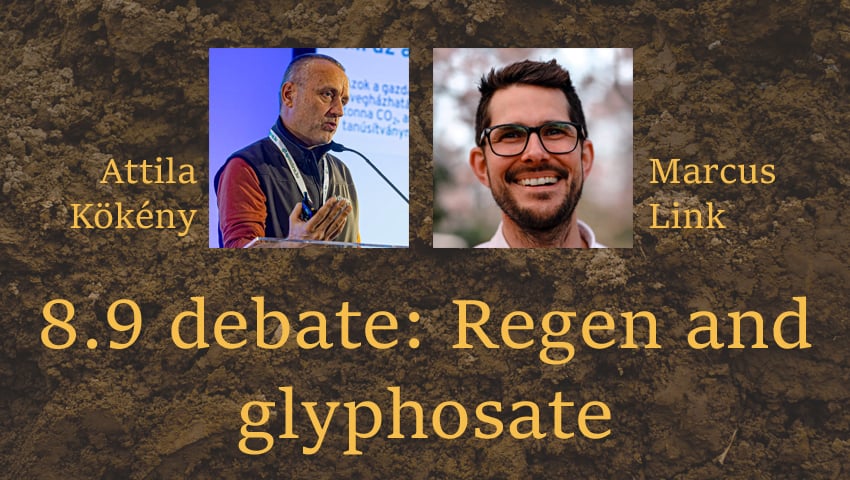Throughout this week, two reg ag practitioner-experts will debate the contentious issue of glyphosate in a series of articles.
Is glyphosate critical to regenerative agriculture?
- Attila Kökény, a regenerative agriculture consultant based in Hungary, kicks off the conversation
- Marcus Link, from New Foundation Farms has now responded
- The views of the correspondents do not necessarily reflect the views of the 8point9.com team.
ATTILA KÖKÉNY’S OPENING STATEMENT:
This is a good question, because food production that is based on principles of regenerative agriculture can only be truly sustainable without external inputs.
In the current supply and trade structure of Western civilisation, commodities are produced on the largest land. An important activity in arable cropping is weed control, which farmers have practised for more than 12,000 years by tilling the soil.
This is about the same time as the first man-made erosion sediments appeared in lakes. Dust Bowl events were already blowing and mudflows were washing away ploughed topsoil at the beginning of Holocene, even though the ox-drawn ards tilled the soil only to the depth of current minimum tillage technology.
Think of the Greek and Spanish deserts, where rocky, barren land was once sea to sea forests and grasslands. These fertile soils have all been eroded by agriculture, which has also disrupted small water cycles, terminated local rainfalls, and turned once rich lands into man-made deserts.
Agriculture has eroded several metres of fertile topsoil all over the world and the intensification of this activity continues to cause incalculable economic, environmental and health damage.
The eradication of this Stone Age technology only began in the 1960s with the introduction of no-till farming, after the first herbicides such as 2,4D, Atrazine and Paraquat appeared. These highly toxic herbicides are dangerous to use (although, interestingly, no one is campaigning against them worldwide), so no-tillers were relieved when glyphosate entered into market. However, farming is still dominated by tillage, which is responsible for the 60-70% humus loss of our soils.
This degenerative technology can only be reversed by regenerative agriculture based on no-till. The simplest regenag is holistic grazing, as there are no more weed problems that require tilling or herbicides.
In arable farming, cover crops, crop rotation, mulching and grazing all help to reduce weed pressure, but there are no miracles.
Weeds don’t just go away, they reduce yields significantly and put our health at risk with toxic chemicals, like tropans.
Besides annual weeds, it’s the ever-growing number of perennial weeds that cause the biggest headaches.
So the farmer can choose to till the soil 5 or 6 times a year when, for example, Canada thistle appear on the fields, exhausting the plant and causing staggering structural damage, moisture loss and erosion to soil, or successfully control them with 2 to 3 drops of glyphosate per square metre in a no-till system.
